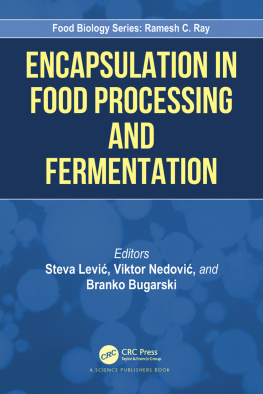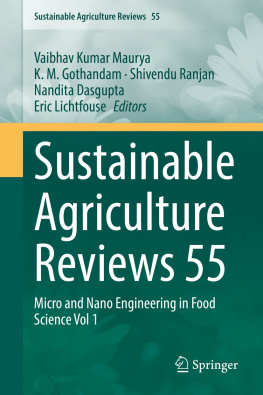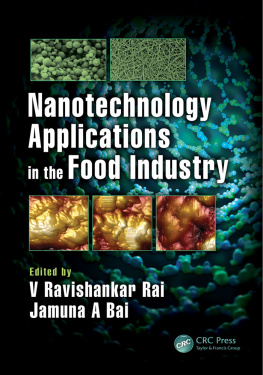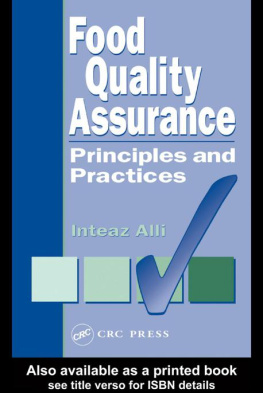
Encapsulation in Food Processing and Fermentation
Books Published in Food Biology series
- Microorganisms and Fermentation of Traditional Foods
Ramesh C. Ray, Montet Didier (eds.), 2014
- Bread and Its Fortification: Nutrition and Health Benefits
Cristina M. Rosell, Joanna Bajerska, Aly F. El Sheikha (eds.), 2015
- Authenticity of Foods of Animal Origin
Ioannis Sotirios Arvanitoyannis (ed.), 2015
- Fermented Foods, Part I: Biochemistry and Biotechnology
Didier Montet, Ramesh C. Ray (eds.), 2015
- Foodborne Pathogens and Food Safety
Md. Latiful Bari, Dike O. Ukuku (eds.), 2015
- Fermented Meat Products: Health Aspects
Nevijo Zdolec (ed.), 2016
- Fermented Foods of Latin America: From Traditional Knowledge to Innovative Applications
Ana Lucia Barretto Penna, Luis A. Nero, Svetoslav D. Todorov (eds.), 2016
- Lactic Acid Fermentation of Fruits and Vegetables
Spiros Paramithiotis (ed.), 2016
- Microbial Enzyme Technology in Food Applications
Ramesh C. Ray, Cristina M. Rosell (eds.), 2016
- Acetic Acid Bacteria: Fundamentals and Food Applications
Ilkin Yucel Sengun (ed.), 2017
- Fermented Foods, Part II: Technological Interventions
Ramesh C. Ray, Montet Didier (eds.), 2017
- Food Traceability and Authenticity: Analytical Techniques
Didier Montet, Ramesh C. Ray (eds.), 2018
- Seafood Safety and Quality
Md. Latiful Bari, Kozi Yamazaki (eds.), 2018
- Food Molecular Microbiology
Spiros Paramithiotis (ed.), 2019
- Winemaking Basics and Applied Aspects
V.K. Joshi and Ramesh C. Ray (eds.), 2021
- Mycotoxins in Food and Beverages: Innovations and Advances, Part I
Didier Montet, Catherine Brabet, Sabine Schorr-Galindo, Ramesh C. Ray (eds.), 2021
- Mycotoxins in Food and Beverages: Innovations and Advances, Part II
Didier Montet, Catherine Brabet, Sabine Schorr-Galindo, Ramesh C. Ray (eds.), 2021
- Bioactive Compounds in Fermented Foods: Health Aspects
Amit Kumar Rai, Anu Appaiah K. A. (ed.), 2022
Food Biology Series
Encapsulation in Food Processing and Fermentation
Editors
Steva Levi
Department of Food Technology and Biochemistry University of Belgrade Faculty of Agriculture Belgrade, Serbia
Viktor Nedovi
Department of Food Technology and Biochemistry University of Belgrade Faculty of Agriculture Belgrade, Serbia
Branko Bugarski
Department of Chemical Engineering University of Belgrade Faculty of Technology and Metallurgy Belgrade, Serbia
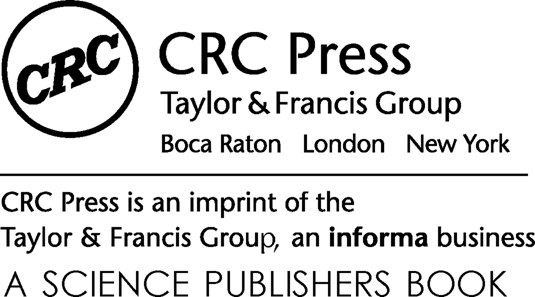
First edition published 2022
by CRC Press
6000 Broken Sound Parkway NW, Suite 300, Boca Raton, FL 33487-2742
and by CRC Press
4 Park Square, Milton Park, Abingdon, Oxon, OX14 4RN
2022 Taylor & Francis Group, LLC
CRC Press is an imprint of Taylor & Francis Group, LLC
Reasonable efforts have been made to publish reliable data and information, but the author and publisher cannot assume responsibility for the validity of all materials or the consequences of their use. The authors and publishers have attempted to trace the copyright holders of all material reproduced in this publication and apologize to copyright holders if permission to publish in this form has not been obtained. If any copyright material has not been acknowledged please write and let us know so we may rectify in any future reprint.
Except as permitted under U.S. Copyright Law, no part of this book may be reprinted, reproduced, transmitted, or utilized in any form by any electronic, mechanical, or other means, now known or hereafter invented, including photocopying, microfilming, and recording, or in any information storage or retrieval system, without written permission from the publishers.
For permission to photocopy or use material electronically from this work, access
Trademark notice: Product or corporate names may be trademarks or registered trademarks and are used only for identification and explanation without intent to infringe.
Library of Congress Cataloging-in-Publication Data
Names: Levic, Steva, 1981- editor. | Nedovic, Viktor, editor. | Bugarski, Branko, editor.
Title: Encapsulation in food processing and fermentations / editors, Steva Levic, Department of Food Technology and Biochemistry, University of Belgrade, Belgrade, Serbia, Viktor Nedovic, Department of Food Technology and Biochemistry, University of Belgrade, Belgrade, Serbia, Branko Bugarski, Department of Chemical Engineering, University of Belgrade, Belgrade, Serbia.
Description: First edition. | Boca Raton : CRC Press, Taylor & Francis Group, [2022] | Includes bibliographical references and index. | Summary: The book Encapsulation in food processing and fermentations provides new insights into food encapsulation processes. The chapters are organized in such manner, so even readers who are not familiar with encapsulation could easily educate and find information of interest. Through the chapters, the book offers the most important aspects of encapsulation in general as well as state-of-the-art of modern industrial encapsulation procedures. In the specialized chapters, the topics such as encapsulation of food additives, probiotics, microorganisms for fermentations and nanoencapsulation are discussed-- Provided by publisher.
Identifiers: LCCN 2021045213 | ISBN 9780367258313 (hbk) | ISBN 9781032160269 (pbk) | ISBN 9780429324918 (ebk)
Subjects: LCSH: Coated foods. | Food--Packaging. | Fermented foods. | Dietary supplements--Preservation. | Extracts--Preservation. | Microencapsulation.
Classification: LCC TP374 .E54 2022 | DDC 664/.09--dc23/eng/20211109
LC record available at https://lccn.loc.gov/2021045213
ISBN: 978-0-367-25831-3 (hbk)
ISBN: 978-1-032-16026-9 (pbk)
ISBN: 978-0-429-32491-8 (ebk)
DOI: 10.1201/9780429324918
Typeset in Times New Roman
by Innovative Processors
Preface to the Series
Food is the essential source of nutrients (such as carbohydrates, proteins, fats, vitamins, and minerals) for all living organisms to sustain life. A large part of daily human efforts is concentrated on food production, processing, packaging and marketing, product development, preservation, storage, and ensuring food safety and quality. It is obvious therefore, our food supply chain can contain microorganisms that interact with the food, thereby interfering in the ecology of food substrates. The microbe-food interaction can be mostly beneficial (as in the case of many fermented foods such as cheese, butter, sausage, etc.) or in some cases, it is detrimental (spoilage of food. mycotoxin. etc.). The Food Biology series aims at bringing all these aspects of microbe-food interactions in form of topical volumes, covering food microbiology, food mycology, biochemistry, microbial ecology, food biotechnology and bio-processing, new food product developments with microbial interventions, food nullification with nutraceuticals, food authenticity, food origin traceability. and food science and technology. Special emphasis is laid on new molecular techniques relevant to food biology research or to monitoring and assessing food safety and quality, multiple hurdle food preservation techniques, as well as new interventions in biotcchnological applications in food processing and development.
Next page
